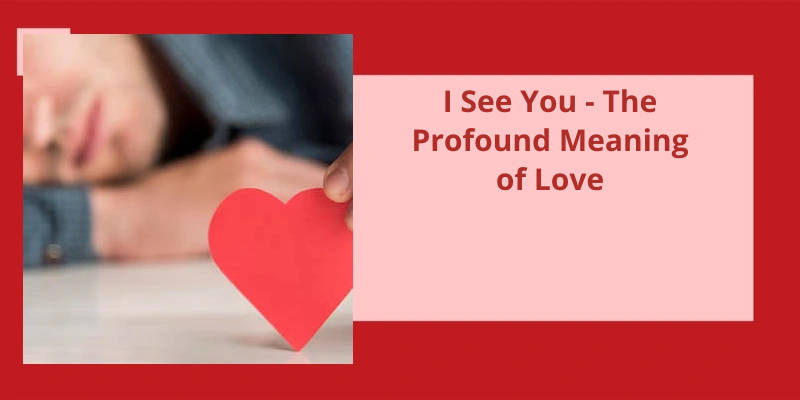"I See You: The Profound Meaning of Love" delves into the intricacies of the phrase "I see you" within the realm of love, uncovering it’s profound significance that often goes unnoticed. This phrase encompasses not only the literal act of visual perception but also holds a deeper connotation, hinting at an emotional connection, support, and understanding. It encapsulates the essence of being fully present and attentive to another person's needs and aspirations, offering solace and reassurance. "I see you" signifies a commitment to stand by someone's side, acting as a steadfast presence, and eliminating apprehensions. This exploration unravels the layers of meaning embedded within these three simple words, illuminating the profound impact they can have on fostering deeper bonds and strengthening the fabric of love.
What Does It Mean When Someone Say I See You When I See You?
When someone says “I see you,” it carries a profound meaning that goes beyond a mere statement of visual perception. This phrase is often used as a way to acknowledge someone truly, both physically and emotionally. It’s a recognition and understanding that goes beyond the surface level.
In the context of farewell, “see you when I see you” implies a sense of uncertainty regarding the next meeting. It acknowledges that the future is unknown, and the speaker can’t predict when the next encounter will occur. It can also imply an acceptance and surrender to the unpredictability of life, emphasizing the need to let go of expectations and live in the present moment.
This phrase is often used in informal settings, among friends or loved ones, as it adds a personal touch to the farewell. It signifies a connection between individuals that transcends time and space, recognizing that even if the meeting is delayed or infrequent, the bond remains strong. It reflects a mutual understanding that life may lead each person on different paths, but the connection and love shared between them will endure.
“I see you when I see you” also highlights the importance of maintaining a sense of openness and flexibility in relationships. It encourages both parties to cherish the moments they’ve together, while simultaneously accepting the uncertainty of the future. It reminds us to appreciate the present and to make the most of the time we’ve with loved ones, as we never know when the next opportunity to connect will arise.
One of the most common questions when it comes to love revolves around the distinction between being in love and simply saying “I love you.” While being in love tends to evoke a sense of infatuation and attraction, loving someone transcends these initial feelings. It involves acknowledging and accepting the person’s imperfections, embracing their flaws and weaknesses, and still feeling a deep affection and care towards them. In essence, love encompasses a complete acceptance and appreciation of the person as a whole, flaws and all.
What’s the Difference Between Being in Love and Saying I Love You?
Being in love is like being under a spell, where your thoughts and emotions are consumed by the other person. It’s a magnetic pull that draws you towards them, making you feel a rush of excitement, happiness, and passion. In this state, you may idealize the person, believing that they’re perfect in every way. You may overlook their flaws and shortcomings, choosing to focus only on their positive attributes. This infatuation is powerful and all-consuming, but it can also be fleeting and transient.
On the other hand, saying “I love you” is a profound expression of affection and care for someone. It goes beyond the initial infatuation and delves deeper into a genuine connection. When you love someone, you not only see their strengths but also their weaknesses. You accept and embrace their imperfections, understanding that it’s these very qualities that make them unique and special. Love allows you to be vulnerable and authentic with another person, creating a bond that’s built on trust, mutual understanding, and support.
While being in love can be exhilarating, it can also be short-lived. The initial passion and intensity may fade over time, especially when faced with challenges and difficulties. However, loving someone is a consistent choice that you make every day. It requires effort, patience, and perseverance to maintain a strong and healthy relationship. Loving someone means committing to them, even when times get tough, and actively working on nurturing the connection between you both.
How to Distinguish Between Infatuation and Genuine Love
Infatuation and genuine love can sometimes be difficult to distinguish, but there are a few key differences to look out for.
Infatuation tends to be more focused on physical attraction and an idealized image of the person, whereas genuine love goes beyond surface-level infatuation and encompasses a deeper emotional connection.
Infatuation often fades quickly, whereas genuine love is more enduring and withstands the test of time.
Additionally, infatuation is often based on self-gratification and possessiveness, whereas genuine love is selfless and seeks the well-being and happiness of the other person.
It’s important to take the time to truly get to know someone and develop a strong emotional bond before jumping to conclusions about whether it’s infatuation or genuine love.
Source: Love VS Being In Love: 11 Basic Differences – Happier Human
When someone says “I see,” they’re expressing understanding or comprehension of what’s been said to them. It’s a way of acknowledging and indicating that they’ve understood the information conveyed.
What Does It Mean When a Person Says I See?
When someone says “I see,” it often goes beyond it’s literal meaning of visual perception. It implies a deeper level of understanding and comprehension. When we say “I see,” we acknowledge that we’ve grasped the message or idea being communicated to us. It’s a powerful affirmation that we aren’t just passively receiving information, but actively engaging with it.
“I see” can also be an expression of respect and validation. It demonstrates our willingness to consider and respect different viewpoints, even if they differ from our own. It encourages a sense of shared humanity, promoting empathy and compassion in our interactions with others.
In the context of love, saying “I see you” implies more than just acknowledging someones presence. It means recognizing their essence, understanding their dreams, fears, and desires. It encompasses seeing their vulnerabilities and strengths, embracing their flaws, and accepting them unconditionally. When we say “I see you” to a loved one, we’re reassuring them that they’re seen in their entirety and that their existence is deeply valued.
It transcends it’s literal interpretation, representing a deep emotional bond between individuals. It’s a powerful reminder that we aren’t just passive observers; we’re active participants in each others lives.
The meaning of “I love you” goes beyond mere words. It signifies a deep and unwavering commitment towards someone, encompassing presence, support, and dedication to the relationship. When you utter those three words, you affirm your commitment to that person and the strength of your bond. It conveys your unwavering presence, both physically and emotionally, as a testament to the depth of your love.
Why Is the Meaning of I Love You?
You’re acknowledging that you’re willing to step into the depths of love and stand by their side through thick and thin. It signifies a deep emotional connection and a willingness to be vulnerable. When you say “I love you,” you’re offering your unwavering support and urging them to do the same.
It encompasses presence, commitment, acceptance, belonging, and growth. It’s a declaration of a deep bond and a promise to be there for one another through all of lifes ups and downs. It’s a powerful affirmation of the connection between two souls, signifying the profound significance of love in our lives.
The Different Ways People Express Love
Love is a complex and personal emotion that can be expressed in various ways. Some individuals express love through acts of service, going out of their way to help and support their loved ones. Others show their love through words of affirmation, expressing their affection and appreciation verbally. Physical touch is also a common way that people convey their love, whether it’s through gentle gestures or intimate embraces. Additionally, giving and receiving gifts can be seen as a way to demonstrate love, as it shows thoughtfulness and consideration. Quality time is yet another way people express love, prioritizing being together and creating meaningful memories. Ultimately, everyone has their own unique way of expressing love, and understanding these differences can deepen our connections with one another.
It goes beyond mere infatuation or attraction, encompassing a profound connection that transcends ego and selfish desires. Love involves empathy, compassion, and a genuine desire for the happiness and fulfillment of another person. It’s a complex and multifaceted emotion that can’t be easily defined, but one thing is certain: love is a powerful force that can bring immense joy and transformation to our lives.
What Is the Accurate Meaning of Love?
It’s a connection that goes beyond mere attraction or infatuation. Love encompasses a profound understanding and acceptance of another person, flaws and all. It’s a force that compels people to put someone elses happiness before their own.
Love isn’t just a noun, but a verb. It requires action and commitment. It’s a choice to be there for someone, to support and uplift them in their times of need. Love is a daily practice of kindness, compassion, and forgiveness.
Love fosters growth and encourages individuals to become the best versions of themselves. It pushes them to overcome their limitations and pursue their dreams. Love isn’t possessive or controlling; instead, it allows freedom and space for personal growth.
Love is a transformative power, capable of healing wounds and mending broken hearts. It’s a source of strength during times of adversity, a guiding light that helps individuals navigate lifes challenges. Love provides a sense of security and belonging, creating a nurturing environment where people can thrive and be their authentic selves.
The Different Types of Love (Romantic Love, Familial Love, Platonic Love, Etc.)
Love is a complex and multi-faceted emotion that manifests in various ways. Romantic love, often portrayed in movies and novels, is the passionate affection between two individuals. It’s filled with desire, attraction, and emotional intimacy.
Familial love refers to the strong bonds shared among family members. This type of love is rooted in care, support, and unconditional acceptance. It’s commonly observed between parents and children, siblings, and extended family.
Platonic love exists between friends and is characterized by deep emotional closeness without any romantic or physical aspect. Platonic love is built on mutual respect, trust, and understanding.
There’s also self-love, which entails recognizing one’s worth, accepting oneself, and prioritizing personal well-being. It involves nurturing a healthy relationship with oneself and practicing self-care.
Ultimately, love in all it’s forms speaks to the profound connections we forge with others, defining who we’re and enriching our lives with compassion and empathy.
Conclusion
In the realms of love, the phrase "I see you" goes far beyond mere physical presence or reassurance. It delves into the profound meaning of love, encapsulating the essence of true connection and understanding. To say "I see you" is an acknowledgment of the entirety of a person, not just their surface or superficial qualities. It’s a recognition of their hopes, fears, dreams, and vulnerabilities. It’s a declaration of unwavering support, a promise to always be there, unwavering, through the tumultuous ebbs and flows of life. It’s through this lens of profound love that we find solace, security, and unyielding devotion, enriching our lives with unparalleled depths of connection and meaning.






